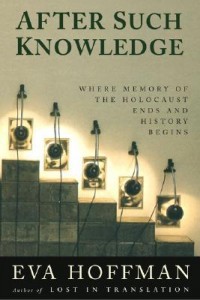Jewish Literary Links for Shabbat

Shabbat shalom.

Shabbat shalom.
As we approach Yom HaShoah (Holocaust Remembrance Day), author Ellen Cassedy shares reflections on an influential book in this guest post.
Remembering the Holocaust with Eva Hoffman
by Ellen Cassedy
 “What meanings does the Holocaust hold for us today – and how are we going to pass on those meanings to subsequent generations?” These are the questions Eva Hoffman poses in her courageous book, After Such Knowledge: Memory, History, and the Legacy of the Holocaust.
“What meanings does the Holocaust hold for us today – and how are we going to pass on those meanings to subsequent generations?” These are the questions Eva Hoffman poses in her courageous book, After Such Knowledge: Memory, History, and the Legacy of the Holocaust.
Hoffman’s acclaimed memoir, Lost in Translation, recounts her emigration from Poland at age 13 with her parents, who were Holocaust survivors, and her struggles to adjust to her new home in Canada. Published 15 years later, in 2004, After Such Knowledge is less well-known, but it made a deep impression on me when I first read it. As we observe Yom HaShoah, Holocaust Remembrance Day, I’ve been rereading it and finding it as provocative and valuable as ever.
The book is a multi-faceted meditation. It draws on Hoffman’s personal experiences and those of other children of survivors; her extensive reading in the fields of psychology, culture, and politics; and her years of conversations with Poles and Germans of all ages.
I discovered the book at the exact moment that I myself was embarking on a journey to the Old World – to Lithuania, the land of my Jewish forebears. (more…)
 In 2006, Günter Grass’s confession that he’d been a member of the Waffen SS surprised me. But it didn’t depress me. It didn’t anger me. Grass seemed appropriately ashamed and regretful. I knew him to be an advocate for Germany’s recognition of its Nazi past. He wasn’t asking for my forgiveness, but he would have had it, anyway.
In 2006, Günter Grass’s confession that he’d been a member of the Waffen SS surprised me. But it didn’t depress me. It didn’t anger me. Grass seemed appropriately ashamed and regretful. I knew him to be an advocate for Germany’s recognition of its Nazi past. He wasn’t asking for my forgiveness, but he would have had it, anyway.
I’d read the closing words of his 2002 novel, Crabwalk, as a regretful but accepting acknowledgment of the lasting reverberations of this past, for all of us. Those lines—“It doesn’t end. Never does it end.”—moved me so deeply that I included them as one of two epigraphs for my short story collection, Quiet Americans. (The other epigraph, also from a Nobel laureate, is Imre Kertész’s “Which writer today is not a writer of the Holocaust?”) My book is inspired largely by the histories and experiences of my paternal grandparents, German Jews who immigrated to the U.S. in the late 1930s, and by my preoccupations with that legacy. The suggestions of the Holocaust’s enduring presence in other people’s minds, souls, and history seemed to be encapsulated in these lines. In fact, Grass and Crabwalk received another mention in one of the book’s stories, as part of the narrator’s point about wartime sufferings endured by non-Jewish German civilians. (Which, I believe, remains valid.)
But now I have to look at the Grass epigraph differently. (more…)

Shabbat shalom!

Shabbat Shalom and Chag Pesach Sameach!